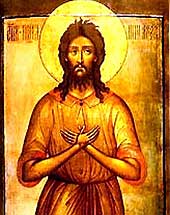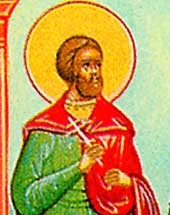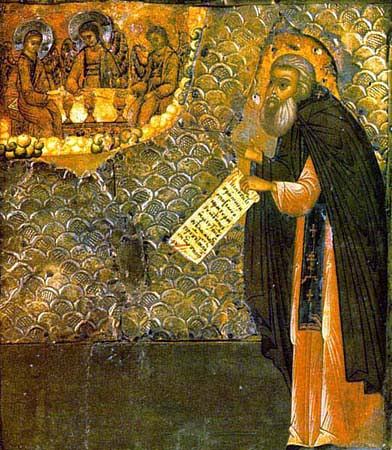|
|
St Alexis, the Man of God Varied are the paths along which God leads those who desire to be pleasing to Him and fulfil His Law. In the time of the Emperor Honorius (393-423), there lived in Rome a high imperial dignitary, Euphemianus, very eminent and very rich. Both he and his wife, Agalais, lived lives pleasing to God. Although he was rich, Euphemianus sat down to table only once a day, at sunset. They had an only son, this Alexis, who, when he was grown up, was compelled to marry. But, on the night of the wedding, he left not only his wife but also his father, took ship and went to the town of Edessa in Mesopotamia, where the wonderful Face of the Lord Himself, sent to King Abgar, was kept. Having venerated this Face, Alexis dressed himself in simple clothing and lived for seventeen years as a poor man in that town, constantly praying to God in the porch of the church of the Mother of God. When he became known as a holy man, he shunned the praise of men and so went off and took a ship that was going to Laodicea. By the providence of God, the ship went off course and took him right to Rome. Regarding this as a cross from God, Alexis decided to go to his father"s house and there, unknown, continue his life of self-denial. His father did not recognise him, but from charity allowed him to live in his courtyard in a little shack. There Alexis spent seventeen further years, living only on bread and water. Molested by the servants in many ways, he persevered to the end. And when the end drew near, he wrote a few words on a single sheet of paper, held it in his hand, lay down and breathed his last, on March 17th, 411. Then a voice was heard in the Church of the Holy Apostles, saying to the Emperor, who was present, and the Patriarch: "Look for the Man of God." Shortly afterwards it was revealed that this Man of God was in Euphemianus"s house. The Emperor, the Pope and their whole escort came to Euphemianus"s house and, after lengthy questioning, discovered that the poor man was the Man of God. When they went into his shack, they found him dead with his face shining like the sun. His parents discovered from the paper that he was their son Alexis; and his bride, who had lived for thirty-four years without him, that this was her husband, and they were overcome by immeasurable sorrow and grief. But then they were comforted, seeing how God had glorified His chosen one. For, on touching his body, many of the sick were healed, and a sweet myrrh came forth from it. He was buried in a coffin of marble and emerald. His head is preserved in the Church of St Laurus in the Peloponnese. Varied are the paths along which God leads those who desire to be pleasing to Him and fulfil His Law. In the time of the Emperor Honorius (393-423), there lived in Rome a high imperial dignitary, Euphemianus, very eminent and very rich. Both he and his wife, Agalais, lived lives pleasing to God. Although he was rich, Euphemianus sat down to table only once a day, at sunset. They had an only son, this Alexis, who, when he was grown up, was compelled to marry. But, on the night of the wedding, he left not only his wife but also his father, took ship and went to the town of Edessa in Mesopotamia, where the wonderful Face of the Lord Himself, sent to King Abgar, was kept. Having venerated this Face, Alexis dressed himself in simple clothing and lived for seventeen years as a poor man in that town, constantly praying to God in the porch of the church of the Mother of God. When he became known as a holy man, he shunned the praise of men and so went off and took a ship that was going to Laodicea. By the providence of God, the ship went off course and took him right to Rome. Regarding this as a cross from God, Alexis decided to go to his father"s house and there, unknown, continue his life of self-denial. His father did not recognise him, but from charity allowed him to live in his courtyard in a little shack. There Alexis spent seventeen further years, living only on bread and water. Molested by the servants in many ways, he persevered to the end. And when the end drew near, he wrote a few words on a single sheet of paper, held it in his hand, lay down and breathed his last, on March 17th, 411. Then a voice was heard in the Church of the Holy Apostles, saying to the Emperor, who was present, and the Patriarch: "Look for the Man of God." Shortly afterwards it was revealed that this Man of God was in Euphemianus"s house. The Emperor, the Pope and their whole escort came to Euphemianus"s house and, after lengthy questioning, discovered that the poor man was the Man of God. When they went into his shack, they found him dead with his face shining like the sun. His parents discovered from the paper that he was their son Alexis; and his bride, who had lived for thirty-four years without him, that this was her husband, and they were overcome by immeasurable sorrow and grief. But then they were comforted, seeing how God had glorified His chosen one. For, on touching his body, many of the sick were healed, and a sweet myrrh came forth from it. He was buried in a coffin of marble and emerald. His head is preserved in the Church of St Laurus in the Peloponnese.The Holy Martyr Marinus He was a soldier, and not only refused to offer sacrifice to idols, but took things sacrificed by others and trod them underfoot. For this he was tortured and beheaded in the third century. A senator, Asterius, clad in costly white raiment, was watching the sufferings of St Marinus, and he became so fired with enthusiasm for the Faith of the Christ who gave such courage to His followers that he took the body of the martyr onto his back, bore it away and buried it. Seeing this, the unbelievers killed him also as a Christian. He was a soldier, and not only refused to offer sacrifice to idols, but took things sacrificed by others and trod them underfoot. For this he was tortured and beheaded in the third century. A senator, Asterius, clad in costly white raiment, was watching the sufferings of St Marinus, and he became so fired with enthusiasm for the Faith of the Christ who gave such courage to His followers that he took the body of the martyr onto his back, bore it away and buried it. Seeing this, the unbelievers killed him also as a Christian.Venerable Macarius, abbot of Kalyazin (1483) The Monk Makarii of Kalyazinsk (in the world Matfei) was born in 1400 in the village of Gribkovo (Kozhino), near the city of Kashin, into the family of the boyar Vasilii Kozha. From youth he yearned after monasticism, but at the will of his parents he married. After a year his parents died, and after three years more reposed also his wife Elena. Having nothing that would bind him to his former life, Matfei was vowed a monk at the Nikolaev Klobukovsk monastery... The Monk Makarii of Kalyazinsk (in the world Matfei) was born in 1400 in the village of Gribkovo (Kozhino), near the city of Kashin, into the family of the boyar Vasilii Kozha. From youth he yearned after monasticism, but at the will of his parents he married. After a year his parents died, and after three years more reposed also his wife Elena. Having nothing that would bind him to his former life, Matfei was vowed a monk at the Nikolaev Klobukovsk monastery...St. Theosterictus the Confessor (826)
Monk-martyr Paul of Crete (767)Abbot of Pelecete Monastery near Prusa.
|